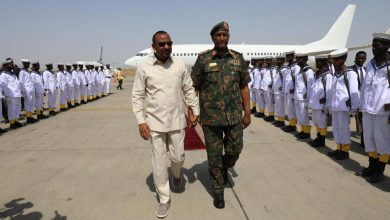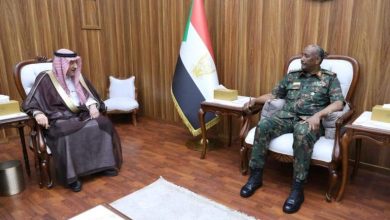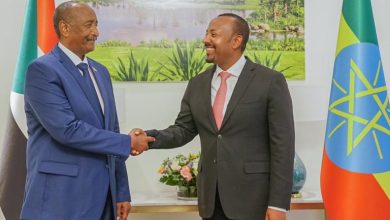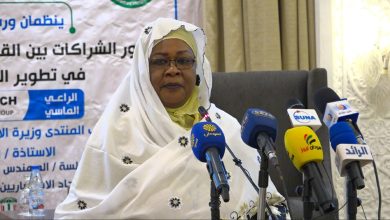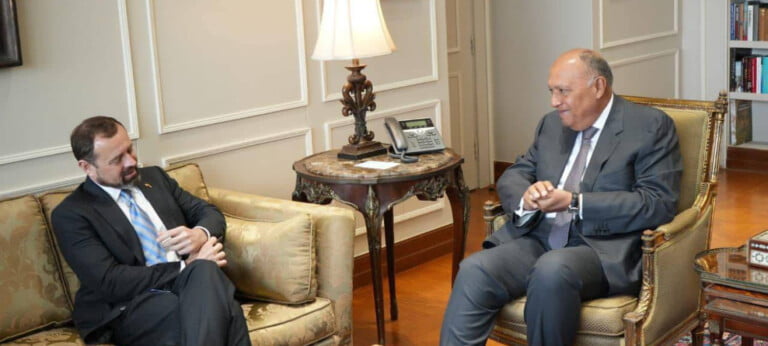
Cairo – almohagig: Sabah Musa
The Special US Envoy for Sudan, Tom Perriello, concluded his two-day visit to Cairo as part of a tour that included all countries involved in the Sudanese crisis in the Arab and African region.
During his visit, the envoy met with the Egyptian Foreign Minister Sameh Shoukry and several Sudanese political and media figures in the Egyptian capital.
He listened to the Egyptian perspective on resolving the crisis and discussed with the Sudanese parties he met how to end the war in Sudan and how to listen to the Sudanese people while considering that political parties do not represent the people. The new US envoy appeared to be more open than his predecessor, with a strong mandate from his administration to end the crisis in Sudan, which he identified as three months before slipping into chaos, famine, and terrorism.
Egypt’s stance
During the meeting between the US envoy and the Egyptian Foreign Minister, Sameh Shoukry emphasised the necessity of involving all political forces and active national parties in any future peace process and permanent cessation of hostilities in Sudan. A statement by the Egyptian Foreign Ministry issued after the meeting emphasised the importance of respecting the principles of Sudan’s sovereignty, unity, and territorial integrity, non-interference in its internal affairs, preserving the state and its institutions, and preventing its disintegration.
Shoukry thanked Perriello for visiting Cairo and briefed him on Egypt’s contacts with all parties to convey key messages about the need to stop the escalation and reach a sustainable agreement to halt the ceasefire. Shoukry also outlined Egypt’s approach, which emphasises dealing with the conflict in Sudan as a purely Sudanese matter and the necessity of avoiding any external interference that impedes efforts to contain it. He pointed to Egypt’s efforts to provide the necessary support to the Sudanese people since the start of the crisis, receiving more than half a million Sudanese citizens, in addition to more than five million other Sudanese living in Egypt, without differentiation between them and Egyptian citizens.
For his part, the US envoy expressed his satisfaction with his visit to Egypt in his first regional tour since taking office. This confirmed the US administration’s recognition of the importance of Egypt’s role and influence in the region and its pivotal role in any future solution to the Sudanese crisis.
The two sides agreed to continue consultations and coordination between the two countries in the coming period.
The US direction
The visit of the US envoy to Cairo in his first regional move indicates that the US administration seems to be relying on the Egyptian vision in the next stage to resolve the Sudanese crisis, and it has realised that Cairo understands the complexities of the Sudanese crisis regionally and internationally.
As the US perspective towards the Egyptian role has changed, so has its approach to engaging with the Sudanese crisis. Sources close to the meetings of the US envoy in Cairo told Almohagig that the envoy blamed the Sudanese political forces, which he saw as not rising to the level of the crisis and not representing the Sudanese people. He urgently asked about how to listen to the Sudanese people. The envoy also wondered about the former regime and its impact and whether it had popular support. He said that the old regime claims to have popular support, and if it does indeed have this support, then let it have its space.
Here, it is understood that the US administration may have realised the necessity of a comprehensive dialogue that does not exclude anyone. It seems that the non-exclusion in the Sudanese crisis has become an inevitable direction at the internal, regional, and international levels after confirming that the old way of dealing with the domination of one component over another of the Sudanese people did not yield its fruits.
The US envoy also discussed in his talks in Cairo the Emirati support for the Rapid Support Forces – according to the sources – the US envoy considered that Emirati support is the reason for prolonging the war in Sudan, noting that the Rapid Support Forces without Abu Dhabi’s support are nothing.
He emphasised that Emirati support is linked to the interests of the UAE in Sudan, adding that these interests cannot be achieved except by stabilising Sudan. According to the sources, the envoy confirmed that there is currently pressure on the UAE to withdraw this support, and this pressure must continue because there is a response from Abu Dhabi.
Meeting with the Democratic Bloc
Dr Mohamed Zakaria, the acting political secretary of the Justice and Equality Movement (JEM) and the spokesperson for the Democratic Bloc clarified that their meeting with the US envoy came at his invitation to the Democratic Bloc and the movements within it. Zakaria told “Almohagig” that they informed the US envoy that they see the solution through implementing the Juba Declaration for Humanitarian Issues signed last May, which advocates the withdrawal of the Rapid Support Forces from civilian areas. This could lead to security negotiations ending in a comprehensive ceasefire agreement. He also emphasised to the envoy the necessity of a comprehensive Sudanese dialogue and the need to avoid the mistakes of the past stage, emphasising that the dialogue must be thorough. They also emphasized the role played by regional and international powers in this dialogue, including Egypt, South Sudan, the United States, and Saudi Arabia, and the importance of delivering humanitarian aid to those affected by the war, which must be under the supervision of the Sudanese government. Additionally, they stressed the need for the United States to work with Sudan’s neighbouring countries and its friends to stop the war, confirming that the envoy’s visit to Cairo comes at an important time for Sudan, with the effects of the war extending to Sudan’s neighbours. He explained that the envoy proposed a dialogue leading to a minimum program agreed upon by the Sudanese on ending the war, mentioning the envoy’s talk about a time frame to focus efforts on the solution. He said that the envoy spoke about a maximum of 4 months to stop the war, fearing that prolonging the war would lead to humanitarian disaster. He added that they share this concern and see that the slide into a civil war is “unlikely,” confirming that the war between the armed forces supported by the Democratic Bloc and the Rapid Support rebels is not a war between components of the Sudanese society, adding that they agree with the envoy that the continuation of the war will increase suffering and worsen the situation. He explained that one of the envoy’s recommendations to them is that the Sudanese themselves are the ones capable of solving the crisis, saying that this is a signal to the Sudanese to rise above the wounds and engage in a Sudanese dialogue without conditions, which is in line with the Democratic Bloc’s vision of the inclusiveness of the dialogue.
He continued, “However, we believe that the international role in bridging the gap between the Sudanese parties would pave the way for sitting at the dialogue table, and this is an important facilitation, expressing his optimism about this international role, which must be accompanied by not repeating the previous mistakes in dealing with one civilian faction over others.”
Continuation of efforts.
Ambassador Salah Halima, Vice President of the Egyptian Council for Foreign Affairs, explained that the visit of the US envoy to Cairo comes within the framework of continuing US efforts to solve the crisis in Sudan. Halima told Almohagig that the visit of the US envoy to Cairo confirms the importance of Egypt’s future role in Sudan, which relies on communication with various Sudanese parties, noting that there may be an anticipated Egyptian role being prepared at present, adding that the new initiative in the solution should focus on inclusivity by gathering all Sudanese parties in the dialogue and agreeing on the outcomes of this dialogue. He confirmed that any other initiative that speaks of exclusion would not lead to a solution, saying that the new US move would take into account the Egyptian vision in the solution, recognising the importance of Egypt’s role in any Sudanese settlement, adding that Egypt’s role in Sudan is pivotal through the initiative of Sudan’s neighbouring countries, which is based on inclusivity regarding the components of the Sudanese crisis, explaining that the stagnation of the initiative of Sudan’s neighbouring countries after its mechanism meeting in the Chadian capital “N’Djamena” is due to the lack of agreement on some regional and international visions with the roadmap set by the initiative.
A new path
As for Osman Mirghani, editor-in-chief of Al-Tayyar newspaper, he saw that there is a new path to solve the Sudanese crisis that goes beyond the Juba path. Mirghani, who met with the US envoy among several writers and Sudanese journalists, told Almohagig that the new envoy appears to be more open than the former US ambassador to Sudan and that his approach is different from his cautious and less open predecessor to the crisis, adding that the new US move will be faster than before. He also hinted from the envoy’s words that the war must stop by all means and compel all parties to do so. He said that the envoy spoke about regional and international pressures, and we felt that these pressures might reach Chapter VII if necessary, explaining that the envoy seemed to be focusing on Egypt at the beginning of his moves. He said, “It appears that there is a conviction that Egypt can give a better description of the crisis than other regional and international parties, pointing out that the envoy has not yet outlined a new way to deal with the crisis and that he needs further follow-up, and that he is open to additional advice.


